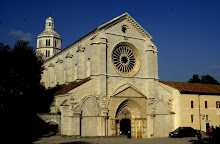Session at the 48th International Congress on Medieval Studies, Kalamazoo, MI: May 9–12, 2013
Communis is organizing two panels on the theme of “Defining the Boundaries of Religious Communities” for next year’s ICMS at Kalamazoo, and welcomes proposals for papers that articulate new ways of framing the study of religious communities during the Central and Later Middle Ages.
Instead of assuming that the distinctions between different modes of religious life were always clear-cut to medieval people, papers should focus on exploring the complexities of defining the boundaries that differentiated various forms of religious life, for example between
- religious and “non-religious” communities
- clerical and lay forms of religious community
- “regular” communities from communities comprised of “secular” clergy
- monastic and canonical communities
- monastic and mendicant communities
- “Observant” and “non-Observant” communities
- male and female forms of religious community
- single-sexed and mixed-gender religious communities
- different levels of membership or participation within a religious community
- shifts in a religious community’s self-identity over time
These sessions seek to open up new research possibilities by “de-constructing” the categories through which modern scholars have traditionally approached the study of medieval religious life, categories which scholars have perhaps too readily assumed were clearly demarcated for medieval people.
Submissions are welcome on both Christian and non-Christian religious communities in medieval Europe, western or eastern. We also invite proposals for papers that focus on religious communities in other cultural regions during the “medieval” period, whether Byzantine, Islamic, East Asian, South Asian, etc. Our intent here is to provide a comparative perspective to enrich discussion of the methodological and philosophical issues raised by the problem of defining religious communities, including to query the actual boundaries and distinctiveness of Latin Christendom as a category of analysis.
Please send paper proposals consisting of a one-page abstract and a complete ICMS Participation Information Form (http://www.wmich.edu/~medinst/files/pif-2013.pdf) by September 15 to the Communis organizers at monasticstudies at gmail dot com
For further information, you may also contact the coordinator for the sessions, Scott Wells, at swells2 at calstatela dot edu
